
views
Dealing with a Condescending Partner or Friend

Keep calm. In communicating with a condescending person, try not to lose your temper, since this can make the situation worse. Before replying to the person, pause for a moment and take a deep breath. Tell yourself something like “I’m trying to point out a problem, but I’m going to stay calm and be civil.”

Be honest. If someone says something to you that is condescending, even in an offhand kind of way, don’t be afraid to stand up for yourself. Let the person know that you feel talked down to, and that the condescension was uncalled for. Being honest is crucial if you want to deal with the situation. Otherwise, the person may not even realize that he or she is being condescending.

Watch your tone of voice. Condescension is often primarily about one’s tone of voice. In other words, it’s not always what a person says, but how it is said that matters. Be careful not to reply to a condescending person with more condescension. This means avoiding sarcasm, muttering things under your breath, raising your voice, etc.

Practice non-defensive communication. To deal with difficult people, you have to choose your words very carefully. Avoid saying things that are defensive, since that can validate the condescending person and ruin the chances of resolving the situation. Luckily, you can usually turn defensive statements into more constructive ones. For instance: Suppose someone says something condescending to you, such as “Well, if I were you, I’d just settle on a career and move on with my life.” You might be tempted to respond with something like “You’re wrong! And stay out of my life.” Instead, try saying something more productive, like “I understand you see it that way. Let me explain why it’s more complicated than that…”

Determine what kind of relationship you have with the person. If you are dealing with a person who has a consistent habit of saying condescending things to you, stop and consider your relationship with that person in general. Try to determine why it is that you find the remarks condescending, based on the kind of relationship you have. With this knowledge, you will be able to communicate more effectively. For instance, if you have a relationship where you feel like you owe a debt to the other person, the pressure of the debt may cause the feelings of condescension. Settle the debt, or be open with the other person about how you feel.

Recognize emotional blackmail. Sometimes, people will use condescension to manipulate others into doing something for them. If a friend or partner says belittling things to you, for instance, he or she might actually fear losing you. The condescending comments would be meant to make you feel inferior and therefore dependent on that person. If you recognize this kind of behavior, communicate calmly and openly communicate with your friend/partner about it.

Nod and smile, when all else fails. Sometimes, the quickest and easiest way to deal with a condescending person is just to move on. If you can stand the condescending comments long enough to get away from that person, just grin and bear it and avoid that person in the future.

Seek professional help, if necessary. If someone’s condescending comments are causing serious damage to a relationship that you value, don’t be afraid to ask for help. Marriage and family advisors, for instance, are trained in helping to mediate between people who are experiencing relationship problems.
Dealing with a Condescending Co-Worker or Boss

Recognize condescending behavior when you see it. Things like shouting, yelling, belittling comments, are all obvious signs of condescension. In the workplace, however, people are sometimes condescending in more subtle ways, such as talking about people behind their backs or trash talking in the form of jokes. If you recognize this behavior, point it out. You can also help to avoid it in the workplace by fostering an environment that discourages gossip, making jokes about coworkers, etc.
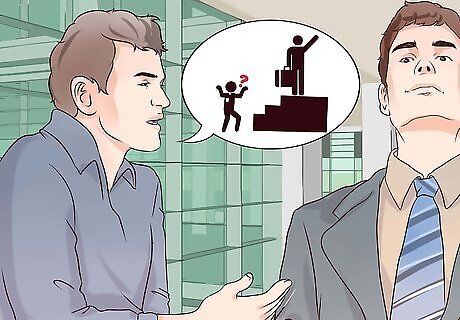
Ignore it and move on. If a person makes a condescending comment without it being part of a pattern of behavior, the most efficient and effective thing to do may be to just move on. Everyone says stupid things now and then, or has a bad day, or unintentionally lashes out at someone. If the condescending comment was just an isolated comment, try to be forgiving and get on with things.

Turn the condescension in to action. Sometimes, you can deflect a person’s condescension. If a coworker acts superior or more knowledgeable than you, communicate with him or her in such a way that those feelings are turned into productivity. Try saying things like: “Could you help me understand?” “What do you think we should do?” “Maybe you’re the best person for this job.”
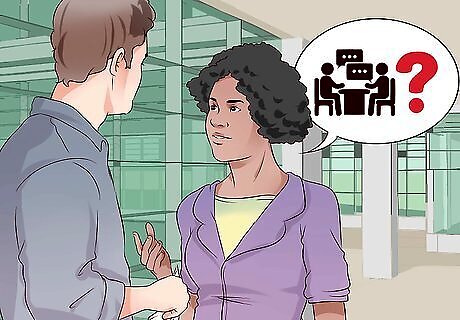
Get support. If you are dealing with a chronically condescending coworker, talk to a supervisor about the behavior problem. Try to have proof of the problem, such as condescending emails that you have saved. If it is your supervisor that is being condescending, things can be more complicated. However, you can still seek support from your coworkers who might be in similar situations.
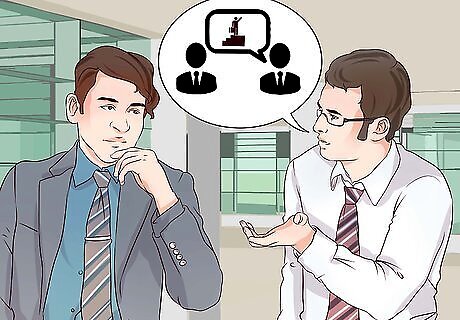
Seek face-to-face discussion. To deal with a condescending coworker or supervisor most efficiently and effectively, ask to set up a personal meeting to discuss the issue. If you don’t want to divulge what the meeting is really about beforehand, suggest that it is for something neutral sounding, like “workplace communication strategies.” You might also ask a supervisor to attend the meeting to serve as a mediator.
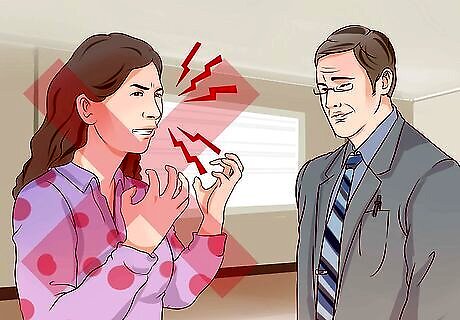
Speak up. If someone's condescension is interfering with your ability to do your job, then you need to call the person out. Without anger, courteously but directly respond to the behavior. Try something like, "I really appreciate your input, I know you have a lot of experience in this area. But, you know, sometimes it can be difficult to ask you questions because I feel like you don't respect me when I don't know something. It can feel very condescending."

Don’t lash out. If the condescending coworker responds with more condescension, resist the urge to retaliate. Take a moment to breathe, calm down, and assess the situation before moving on.

Avoid judgmental body language. Non-verbal communication is always important, especially when trying to work through conflicts. When discussing the problem of condescension with your coworker, watch your body language as well as what you say. Avoid things like: Pointing your fingers Rolling your eyes Crossing your arms Getting in the person’s face Standing above the person while he or she sits
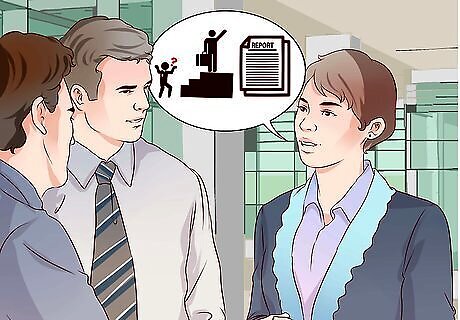
Try to see things through the other person’s perspective. Sometimes, people are condescending without even realizing it. Try rising above the situation and your own feelings, and seek to understand your coworker's point of view. Invite your coworker to explain what he or she was thinking or feeling when saying something you perceived as condescending. Be courteous by saying something like “Why don’t you tell me about your perspective?”

Give a corrective review. After your meeting, you can ask your supervisor to issue a report that offers suggestions for how to deal with and avoid condescending behavior. This report can be directed just to the individuals involved in the conflict, or guidelines for avoiding condescending language and comments can be shared with your whole workplace.




















Comments
0 comment